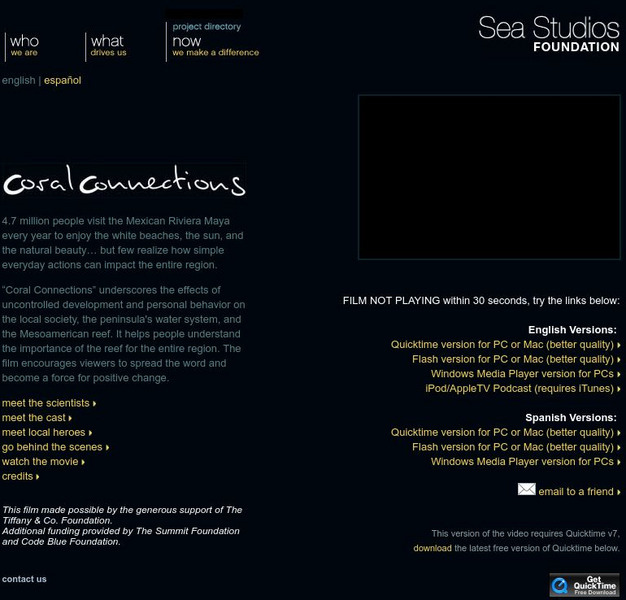Hi, what do you want to do?
California Academy of Science
Coral Reefs and Climate Change
Coral reefs cover less than one percent of the ocean floor, yet more than 25 percent of marine life lives in coral reefs. A colorful, engaging video describes the health of coral reefs and why the formations matter. The first lesson in a...
Curated OER
Coral Reef Ecosystem
The coral reef ecosystem is abundant and lively. Dive in for an underwater view of the species living there. Polyps, urchin, barracudas, and eels (among others) exist in part because of the sun's presence in this ecosystem. Use this as...
Howard Hughes Medical Institute
Coral Bleaching
What is coral bleaching? Tackle a trendy topic with a narrated animation. Through a combination of video and illustration, the narrator introduces viewers to a coral reef, then goes inside a coral polyp to show its symbiotic relationship...
Curated OER
Coral Reef Fish Danger - Blue Planet
Coral reefs are the most diverse communities in the world, but what happens when fishermen catch the fish before they reach a state of maturity? Every year, over 30,000 tons of reef fish come into Hong Kong to be sold at the fish...
Be Smart
Can Coral Reefs Survive Climate Change?
Quick ... name an organism that's an animal, a vegetable, and a mineral. PBS Digital Studios models for viewers the symbiotic relationship between coral reefs zooxanthellae. The video then goes on to explain how climate change has...
TED-Ed
Conserving our Spectacular, Vulnerable Coral Reefs
A three-minute clip covers a new strategy for protecting the coral reefs of Fiji while still allowing fishermen to harvest the fish that people survive on. Connectivity is the name of the game. This colorfully animated resource is a...
Deep Look
What Happens When You Zap Coral With The World's Most Powerful X-ray Laser?
By examining coral skeletons with powerful X-ray technology, scientists are able to track climate change before written records were produced. Learn how in a fascinating video short video.
Curated OER
Exploring the Deep 4 | Corals in the Cold
Did you know coral is actually an animal? Even stranger, corals used to be found primarily in cold water regions! Explore the deep with the help of underwater robotics.
TED-Ed
The Secret Lives of Baby Fish
Dive into an exploration of the life cycles of coral reef fish with this short instructional video. Starting off as larvae floating in the oceans' currents, these little fish can travel thousands of miles, avoiding numerous hazards...
Little Baby Bum
Numbers Song: Counting Fish
Ten eye-catching fish swim around a captivating coral reef in a music video designed to reinforce counting by one.
Nature League
Everyday Biodiversity - Field Trip
Many pupils associate biodiversity with the rain forest or coral reefs, but there is so much more to learn. Join a virtual field trip into a pharmacy to explore the importance of biodiversity in all forms. The second video in a four-part...
Curated OER
Symbiotic Relationships
It's not always tooth and nail in the wild; sometimes animals benefit from each other's presence. Watch a few unique partnerships natural to different environments. Particularly interesting is watching the Goby Fish and the shrimp keep...
American Museum of Natural History
Meet the Ologist: Anna Luz Porzecanski
What classifies a person as an ologist? Great as a remote learning resource, a video interview with a conservative biologist provides insight into the professional path of a scientist. The questions address both professional and personal...
American Museum of Natural History
Meet the Ologist: Mark Siddall
Fun fact: poisons in nature can benefit humans if they are used correctly. A video interview of a zoologist introduces the concept of poisons. The remote learning resource defines poison and provides examples in nature as well as how...
PBS
Pbs Learning Media: A Night in the Coral Reef
Coral reefs are often portrayed as brightly lit, bustling underwater marvels full of colorful creatures. This video segment, adapted from NOVA, paints a different picture as it explores the nocturnal behavior of organisms in the reef....
PBS
Pbs Learning Media: Energy Flow in the Coral Reef Ecosystem
This video segment, adapted from NOVA, describes the energy flow in a coral reef, including its food web. [3:48]
PBS
Pbs Learning Media: Coral Kid
In this video segment, ZOOM guest Cassie takes us on a tour of the coral reef near her home in Key Largo, Florida, and points out some of its unique features. [2:20]
Monterey Institute for Technology and Education
National Oceanic and Atmospheric Administration: Deep Sea Corals
This video explores deep sea corals. Explaining the contrast between deep sea corals and their shallow counterparts and the practical benefits of researching these corals. Two interactive lessons on deep sea corals are also linked to...
Untamed Science
Untamed Science: Biology: World Biomes: Coral Reefs
Read about the biome called the "rainforest of the ocean," because of the rich diversity of life within it. Watch videos and examine maps to learn more about this aquatic biome.
California Academy of Sciences
Ca Academy of Sciences: Diversity and Evolution of Coral Reef Fishes
Dr. Luiz Rocha. Dr. Rocha's research interests center on the evolution, biogeography, and ecology of coral reef fishes. His overarching goal is to understand what drives the extremely high biodiversity found in tropical reefs.
Other
Sea Studios Foundation: Coral Connections
The vast development of the Mexican Riviera Maya over the past thirty years, while hopeful for the economics of the region have created tremendous concern on the greater picture of the local society, water system and Mesoamerican reef....
Miami University
Fish of the Coral Reef
A variety of marine fish species that live in the coral reef. QuickTime, RealOne Player, or Windows Media needed for viewing.
California Academy of Sciences
Ca Academy of Sciences: Gary Williams: Chat With an Academy Scientist
In this chat, Geoff discusses Coral Reef research expeditions at the Academy with Invertebrate Zoologist and Geologist, Gary Williams. [23:41]
Other popular searches
- Coral Reefs Coloring Pages
- Coral Reefs Lessons
- Ocean Coral Reefs
- Coral Reefs Videos
- Coral Reefs of Australia
- Painting Coral Reefs
- Sharks Coral Reefs
- Coral Reefs of Austraila
- Coral Reefs Tourism
- Coral Reefs Lesson Plans
- Formation of Coral Reefs
- Florida Coral Reefs
























